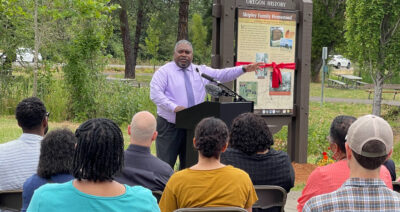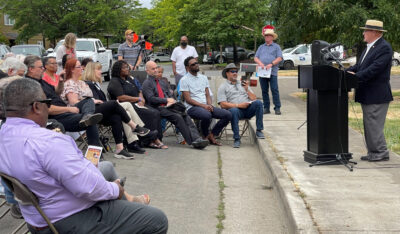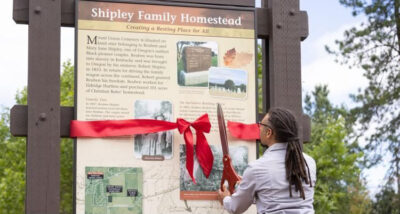Oregon Bahá’ís help recognize Black pioneers
by Sandi Bean, Corvallis, Oregon

Albany Mayor Alex Johnson II describes his experiences as a Black man In Oregon. (Photo by Logan Hannigan-Downs, Corvallis Gazette-Times)
According to the National Center for Race Amity, a national organization that mirrors Bahá’í principles, a key step toward healing the many wounds of racism is to honor and to celebrate the accomplishments of Black heroes. With this in mind, the Corvallis Bahá’ís initiated a project to place a state historical marker to honor 1850s Black pioneers Reuben and Mary Jane Shipley.
The marker was installed and dedicated on Saturday, July 23, 2022, drawing some 150 Oregonians from Philomath, neighboring Corvallis, and even as far away as Portland.
The marker recognizes the Shipleys for their service to the community. Reuben Shipley, an enslaved man in Kentucky, in 1853 agreed to drive Robert Shipley, his then-owner, and his family to Oregon—a journey of more than 2,000 miles. In return Robert agreed to grant Reuben his freedom from enslavement. Robert kept his word.
As a free man, Reuben Shipley went on to marry Mary Jane Holmes, raise six children, and own and farm more than 100 acres of land in what was then the small town of Plymouth. In 1861, Mr. Shipley deeded two acres of his land to create Mt. Union Cemetery in what is now Philomath, Oregon, on the condition that both Black and white persons would be buried there. The historical marker recognizes his contribution and brings the Shipley family’s story to a statewide audience.

Roger Blain, member of the Spiritual Assembly of the Bahá’ís of Corvallis, praises the community collaboration that led to the marker. (Photo by Brad Fuqa, Philomath News)
The Bahá’ís of Corvallis were instrumental in making this happen: obtaining two significant grants, cooperating with the city of Philomath and its City Council for a site, coordinating with the Oregon Black Pioneers on the historical content, and obtaining consent for a marker from the Oregon Travel Information Council. Members of all of those entities were present for the dedication on July 23, along with Bahá’ís from three local communities.
Roger Blaine of the Corvallis Bahá’í community submitted the application in 2015 for the marker. “From its beginning, the Bahá’í Faith has had three distinguishing characteristics,” Dr. Blaine said. “The first of these is holding fast to the oneness of humankind — that we’re all equal, regardless of skin color, gender and religion. The second is collaboration with others of goodwill to create a better community. And third is personal service to others.”
“The Shipley marker that we’re dedicating today on the 150th anniversary of Reuben Shipley’s passing demonstrates all three of these characteristics,” Blaine added.
Oregon begins to address its racist past

Zachary Stocks, Executive Director of Oregon Black Pioneers, cuts the ribbon to dedicate the Shiple Family Marker. (Photo by Logan Hannigan-Downs, Mid-Valley Media)
Oregon was admitted to the United States as a “free” state in name only, as Black persons were barred by law from living in Oregon. In the Oregon territory, in the 1840s, the Black Exclusion Bill included a section known as the “Lash Law.” Black persons who did not leave within three years of their arrival could receive a public lashing every six months until they departed. In 1849, another law was passed barring Black people not already living in Oregon from entering or living in the territory. When Oregon became a state in 1859, the new state constitution included a clause that went still further and barred Black people from owning property or making contracts. It was the first and only state to enter the United States with a prohibition against Black residents. These laws were not removed until 1926. Thus, even today less than 2% of Oregon’s population identifies as Black.
But Oregon has recently begun to address its racist past. In the past few years, three Corvallis elementary schools underwent name changes, prompted by public activism, to honor women of color. Jefferson became Kathryn Jones Harrison Elementary School; Hoover is now Bessie Coleman Elementary School, named for the first African-American woman and first Native American to hold a pilot’s license; and Wilson is now Letitia Carson Elementary School, named for the only Black woman to successfully make a land claim under the Homestead Act of 1862.
For the Shipley Marker dedication, the Bahá’ís of Philomath provided refreshments and distributed roses with this text attached: “’The betterment of the world can be accomplished through pure and goodly deeds…’—Bahá’í Writings. The Bahá’í community is grateful for Reuben Shipley’s contributions, which have made our community a better place.”
Other speakers at the event included Philomath’s former mayor Eric Niemann, Albany Mayor Alex Johnson II, Philomath Mayor Chas Jones, and Zachary Stocks, Executive Director of Oregon Black Pioneers.
This event clearly illustrated what can happen when Bahá’ís are involved in service to their towns and cities, collaborate with like-minded organizations, advocate for social and racial justice, and work together in a spirit of service in the communities where they live and work.
***
For more background on Black history in Oregon, read this National Geographic story.
